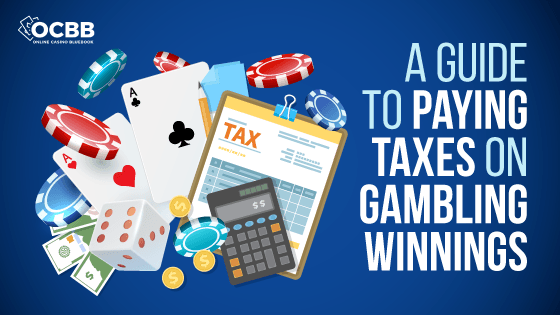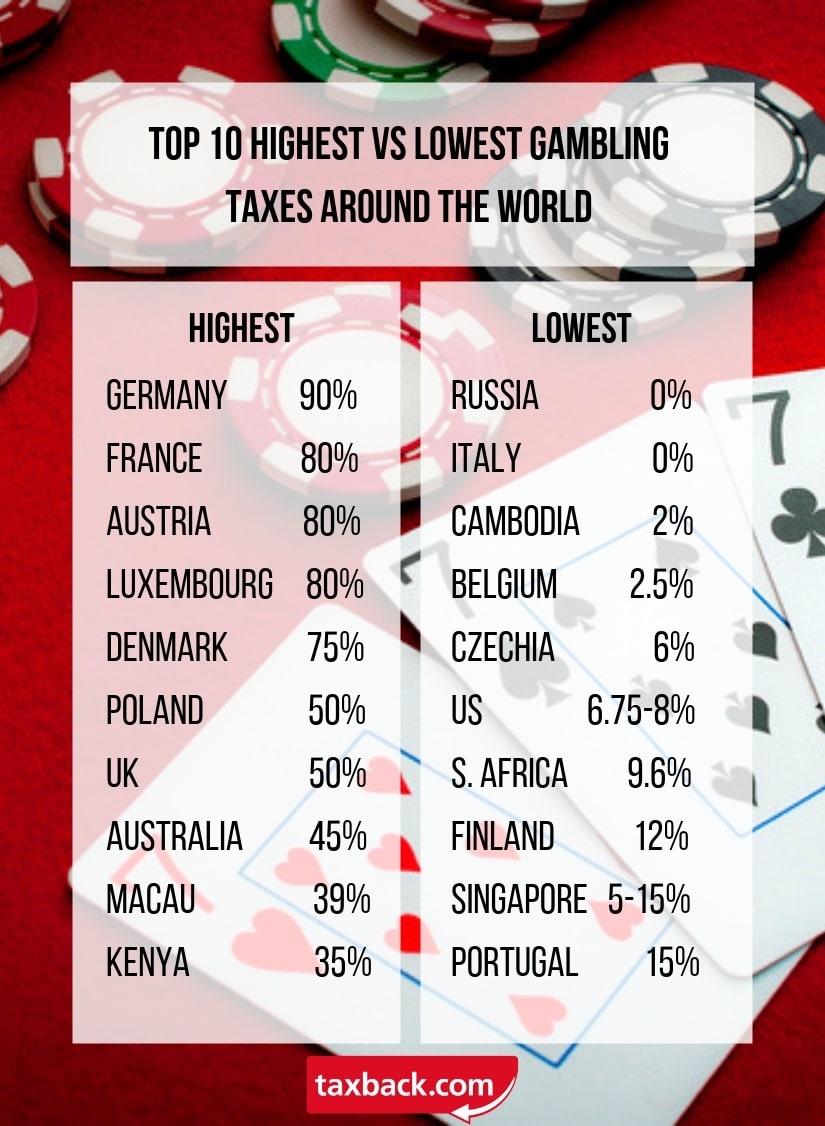Can Gambling Winnings Be Taxed
“All cash and non-cash gambling winnings are taxable and should be reported as ‘other income,’ ” says Patrick Leddy, partner at Farmand, Farmand & Farmand LLP. This includes any winnings you received from casinos, lotteries, raffles or horse races. Mar 09, 2020 Gambling winnings are taxed by both the IRS (Internal Revenue Service) and by many states in US All winnings from all forms of gambling are taxable and must be declared as income on your tax return. All losses from all forms of gambling are deductible as an itemized deduction for recreational players, limited to the amount of winnings declared.
Gambling winnings are fully taxable and you must report the income on your tax return. Gambling income includes but isn't limited to winnings from lotteries, raffles, horse races, and casinos. It includes cash winnings and the fair market value of prizes, such as cars and trips. The news about taxes on gambling winnings doesn’t end there. The gambling institution is required to withhold 24% of your winnings as federal withholding tax, down from the previous 25% under the tax reform law. At tax time, you’ll receive Form W-2G for all reported winnings showing the amount you won and the taxes withheld.
Can gambling be taxed as earnings? Julie Butler considers a recent case on gambling which covers issues frequently raised in the TaxationWeb forum.
Gambling and Taxation
Essentially betting is ‘tax-free’ in the UK – the professional gambler is outside the scope of tax. This is confirmed in HMRC’s Business Income Manual at BIM22015. The basic position is that betting and gambling, as such, do not constitute trading. This is not a new precedent either. Rowlatt J said in Graham v Green (1925) 9 TC 309: “A bet is merely an irrational agreement that one person should pay another person on the happening of an event.”
This decision has stood the test of time. In an Australian case, Evans v FCT (1989) 20 ATC 4540, Hill J said: “There has been no decision of a court in Australia nor, so far as I am aware, in the United Kingdom where it has been held that a mere punter was carrying on a business.”
A recent case has tested this principle. In Hakki v Secretary of State for Work and Pensions [2014] EWCA Civ 530 Mr Hakki was a professional poker player who made a living from his poker winnings. An order for Mr Hakki to pay child maintenance was applied for through the Child Support Agency by the mother of his children (Mrs Blair).
In accordance with the Social Security Contributions and Benefits Act 1992 (SSCBA 1992) s2(1)(b) and the Child Support (Maintenance Assessment and Special Cases) Regulations 1992 Mr Hakki opposed the application on the grounds that his poker winnings did not constitute ‘earnings’ from gainful employment and therefore he was not a self-employed earner, i.e., the profits arose from gambling.
It is very interesting to note that the Upper Tribunal found that for the purposes of SSCBA 1992, gambling could be a trade, profession or vocation, and that Mr Hakki could be said to be ‘gainfully employed’ as a ‘self-employed earner’ and therefore should pay child maintenance to Mrs Blair.
Mr Hakki appealed to the Court of Appeal. Mrs Blair’s barrister argued that Hakki’s poker playing amounted to a trade similar to that of a professional golfer or tennis player. The barrister relied on the findings that Mr Hakki:

- Set a target sum to win after which he stopped;
- Selected the table which was most likely to pay him;
- Appeared on a television programme about poker for a few weeks, made it to the final and won a prize;
- Was the owner of his own website and communicated his strategies for online poker;
- Had his poker results over seven or eight years published on two other poker websites; and
- Chose the locations for playing poker.
The Court of Appeal found that even collectively these findings do not amount to such organisation as to constitute a trade, profession or vocation. The Court of Appeal found that gambling is not a trade and the factors surrounding Mr Hakki must be common to many successful gamblers, e.g., choice of location, setting target sums and the table most likely to pay. It was found that isolated appearances on television and Mr Hakki having his own website was not in 2014 evidence of organisation amounting to a trade or profession. It is also very interesting to note that the court was persuaded that it is possible to accept a case in which a gambler’s winnings might be taxable, but it found that in this case there was no organised seeking of emoluments and therefore no gainful employment.

This case adds to the ongoing discussion about whether a gambler in certain circumstances can be taxed on his or her winnings.
Will there be future legislation that brings gambling profits into the scope of taxation? There has apparently been nothing to indicate that this is under review despite the advent of very sophisticated techniques to make substantial profits from gambling. It has to be asked, what is “the case” that the courts can find as taxable? Is that perhaps the case with sophisticated software?
Back to Tax ArticlesPlease register or log in to add comments.
Click on the button below to get the most burning tax topics delivered to your email.
Subscribe to Our Newsletter Advertiser Disclosure
Advertiser DisclosureWe think it's important for you to understand how we make money. It's pretty simple, actually. The offers for financial products you see on our platform come from companies who pay us. The money we make helps us give you access to free credit scores and reports and helps us create our other great tools and educational materials.
Compensation may factor into how and where products appear on our platform (and in what order). But since we generally make money when you find an offer you like and get, we try to show you offers we think are a good match for you. That's why we provide features like your Approval Odds and savings estimates.
Of course, the offers on our platform don't represent all financial products out there, but our goal is to show you as many great options as we can.
This article was fact-checked by our editors and Jennifer Samuel, senior product specialist for Credit Karma Tax®.
Gambling may just be a hobby to you, but there’s nothing casual about it when it comes to filing your federal income taxes.
Nearly two-thirds of Americans gamble, according to a 2016 Gallup poll. And while you might think that winning a few bucks from a scratch ticket or a weekend trip to Vegas isn’t a big deal, the government considers every dollar you win from gambling as taxable income.
As a result, it’s important to understand how to report your gambling winnings, what to include and how you can use your losses in your favor. Here are some things you should know about how gambling winnings are taxed.
1. You must report all your winnings
Depending on how much you won during the year, you may receive a Form W-2G listing your gambling winnings. But even if you don’t receive the form, you’re still required to report all your winnings as “other income” on your tax return.
“All cash and non-cash gambling winnings are taxable and should be reported as ‘other income,’ ” says Patrick Leddy, partner at Farmand, Farmand & Farmand LLP. This includes any winnings you received from casinos, lotteries, raffles or horse races. Non-cash winnings, such as prizes like cars or trips, are also considered taxable income and are taxed based on their fair market value.
To make sure you keep track of both your winnings and losses, record the following details every time you gamble:
- The date and type of your gamble or gambling activity
- The name and location of the gambling establishment
- Names of other people who were with you, if applicable
- How much you won or lost
- Related receipts, bank statements and payment slips
2. You can deduct some losses
No one likes to talk about how much money they lost gambling. But when it comes to your tax return, being honest can save you money. That’s because the IRS allows you to deduct gambling losses.
Though you may not be able to deduct all your losses.
“Taxpayers can deduct gambling losses only up to the amount of their gambling winnings,” says Leddy, “and only if they itemize their deductions.”
For example, if your gambling winnings totaled $5,000 in the tax year, but you lost $6,000, you can only deduct $5,000 of those losses. Keep in mind, itemizing your deductions may not afford you the maximum tax benefit. If your total itemized deductions — which can also include charitable donations, home mortgage interest and medical expenses — don’t exceed your standard deduction, itemizing might not be the optimum choice for you.
Can Gambling Winnings Be Taxed Online
Can I deduct the cost of a gambling addiction recovery program?
IRS Publication 502 lists alcohol and drug-related addiction-recovery programs as eligible for the medical expense deduction. However, gambling addiction isn’t included. If you need help dealing with a gambling addiction, you can call the Substance Abuse and Mental Health Service Administration’s 24/7, 365-days-a-year hotline at 1-800-662-4357.
3. Even illegal gambling winnings are taxable
According to the American Gaming Association, it’s estimated that Americans spend more than $150 billion per year on illegal U.S. sports betting — and yes, that can include your office March Madness pool.
A May 2018 U.S. Supreme Court ruling opened the door for states to legalize sports betting, but not all have done so. That said, any winnings you receive from betting on sports legally or illegally (or from any illegal activity, for that matter) are still taxable.
Learn more about sports betting and taxes
Bottom line
So how are gambling winnings taxed? Every dollar you win from gambling, whether legally or not, is considered taxable income. As a result, it’s critical that you keep a record of your winnings so that you can report them accurately. You’ll also want to keep track of your losses so that you can use them to qualify for a tax break.
Once you’re ready to file your taxes, Credit Karma Tax® can help show you where to include both your winnings and your losses so that you can maximize your tax refund if you’re owed one.
Can Gambling Winnings Be Taxed Anything
Jennifer Samuel, senior tax product specialist for Credit Karma Tax®, has more than a decade of experience in the tax preparation industry, including work as a tax analyst and tax preparation professional. She holds a bachelor’s degree in accounting from Saint Leo University. You can find her on LinkedIn.